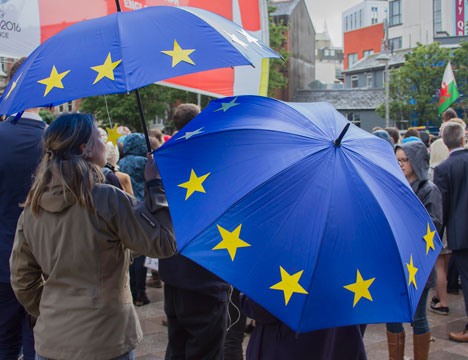Europe has abandoned norms of equality and social solidarity in favour of market freedoms, writes Michael Rustin. A founding editor of Soundings (UK), Rustin considers the damage, disruption and antagonism caused by the neoliberal doctrines that dominate life in the European Union, and whether such trends are reversible following the outcome of the UK referendum.
The question of when neoliberalism would finally encounter its crisis, and what form this would take, has preoccupied Soundings editors since the financial meltdown of 2008-9. Our series on what we called “the conjuncture”, and its development into After Neoliberalism?: The Kilburn Manifesto, sought to understand the neoliberal development and its profoundly transformative effects on British and other societies. We had been surprised that the system had been able to respond without sanction to its gross failure by insisting that its programme of full marketization be pursued with still greater resolve, scarcely acknowledging the persisting economic stagnation of Europe, the larger slow-down of the world economy, increasing levels of inequality, and the breakdown of social solidarity brought about by de-industrialization, immiseration and unemployment. It seemed extraordinary that the banks and the financial sector that were responsible for the financial collapse were able to survive with their wealth and powers unscathed, while the rest of society was obliged to pay the economic and social costs of the losses incurred. The reason why this happened is that the countervailing forces to capital previously represented by working class movements and their parties had been so weakened and compromised by the ascendancy of neoliberal politics, and by the disabling effects of global economic competition, that they no longer had the power to insist on an alternative development, or to achieve significant compromises on the part of capital.

European umbrellas seen in Cardiff, 28 June 2016. Photo: Jeremy Segrott. Source:Flickr
As usually happens, the specific form in which these contradictions manifested themselves was unexpected. There has indeed been a loss of trust among working class populations in the entire system that had earlier promised them a steadily improving standard of living, advancement for the next generation, and economic security. Globalization, promoted by establishments of the centre-left and -right as a necessity that must be embraced, and from which it was alleged new opportunities could be created, has been found to have severe costs. There has been a polarization of response to this situation. Those whose positions in the labour market have been undermined by de-industrialization (in fact, by the transfer of capital to more competitive, lower-wage locations) have turned against the system; while those whose level of education and skills have enabled them to find niches in buoyant sections of the economy have remained at least tolerant of it. These differences coincide to a degree with age, with tolerance of multicultural populations and commingling, and with a more favourable attitude to the cosmopolitanism associated with the European Union. Voting in the UK referendum seems to have been roughly proportional to educational levels – the higher the average level of education in a region, the higher the support for the UK remaining an EU member state, with university graduates being the most likely to vote Remain.
Those disillusioned by this painful experience have turned not to the Left but to the Right for the expression of their discontents. Thus the Single European Market and its rules requiring the free movement both of capital and labour has been rejected by the British electorate – this is what the vote to leave the EU means. Comparable nationalist movements of the Right are in the ascendancy in many countries of Europe. What has happened is that the protests against globalization, capital and free markets by the disadvantaged have been captured by the Right, in the absence of effective resistance from the Left. (Where there has been such resistance, as in Greece, it has been suppressed).
In Britain, the arguments for and against membership of the EU have been conducted largely in terms of the interests exclusively of British nationals, with divisions reflecting those of different segments of the British population. The issues have not been presented, as they should have been, as relevant not just to Britain but to all members of the European Union. Jeremy Corbyn, somewhat reluctantly supporting from the Left Britain’s continued membership because of the employment rights it maintains, endorsed the principle of the free movement of labour, on the grounds that to restrict such mobility would lead to the movement of capital out of Britain to lower wage economies in Europe. His improbable justification for this view was the example of the movement of capital across the Mexican border from the United States. This was not a helpful contribution to the referendum debate, since it failed to address anxieties in Britain about immigration.
The fact is that the principles of the free movement of labour and capital, which have been quite central to the idea of the European Union, represent the implementation on a European scale of the doctrines of neoliberalism. These principles are, and always have been, quite insufficient for the regulation of capitalism in democratic societies. Because an earlier phase of the EU seemed to promise more than this in regard to investment, social protection and redistribution, it won support on the Left in Britain. It is the defeat of this more progressive conception of the EU, and its capture by free market ideology and practice, which has led to the disastrous situation in which the EU now finds itself. It is economically stagnant, it has trashed the democracy of Greece, one of its member states, it is allowing the attenuation of democratic freedoms in some of its members (Poland and Hungary) and not surprisingly it is assailed by the rise of right-wing nationalist movements in several nations. These are the issues that needed to be addressed in the UK referendum campaign. A progressive campaign to Remain should have been based on a commitment to argue for the reform of the basic economic rules by which the EU is now governed.
Liberty, equality, fraternity in Europe
One might have supposed that the canonical principles formulated during the French Revolution would have a central place in the governance of European societies, and that continuing efforts would be made to determine acceptable balances between them. The reality is that these principles each have implications that limit and contradict the other two. In most practical circumstances, the more individual liberty, in an economic environment of competition, the less equality. The enforcement of equality between citizens involves necessary restraints on liberty, for example in the acquisition and disposal of wealth. The more freedom individuals have to pursue their own interests, the weaker the bonds of fraternity (or social solidarity) are liable to become. And the more that absolute economic freedom for individuals, or equality of conditions for all, are imposed by states, the less space is left for civil society to create its own forms of association, and the diversity that follows from them.
Neoliberalism, in its British and European variants, has given overwhelming priority to one of these principles, that of liberty, and in particular the freedom for individuals to bestow their property and labour wherever and however they wish. Earlier constraints on these freedoms, devised to limit their harmful effects in regard to inequality, and to maintain social solidarity (“fraternity”) within nations and their subsidiary communities, have been steadily dismantled. This happened when the competitive advantage which the economies of western Europe and the United States enjoyed for thirty years after World War II came to an end in the 1970s. During those years (named in France les trentes glorieuses), there was a sufficient economic surplus to ensure that virtually everyone could have a share in prosperity, and also to finance a growing sphere of public and welfare provision. In the 1970s this situation came to a turbulent end. Industrial conflict, high inflation and the rejection of hierarchical authority brought political crises in many countries, not least Britain. This moment was seized by the radical Right – Margaret Thatcher in Britain and Ronald Reagan in the USA – and the compromise social settlement which had been established during this period of relative advantage was dismantled.
The underlying engine of this process was globalization – the transfer of competitive economic advantage from the industrialized West to the newly emerging economies of Asia. The neoliberal strategy for dealing with this situation assumed that if the free market was allowed to rule and, through deregulation, be allowed to extend its powers – then even western economies would be able to adjust and find new niches through which they could succeed. The financial sector was a prime example of such a niche. New Labour in part went along with this, though also seeking rather feebly to “upskill” Britain’s economic capabilities and thus take the country upmarket. Blair’s slogan “education, education, education” summarized this approach, but the absence of an industrial or investment strategy to match crippled it, certainly as far as the de-industrialized areas of Britain are concerned.
There could have been alternative ways of meeting this challenge – Germany’s economic model was one, Norway’s decision to put its oil riches into a “Sovereign Wealth Fund” for long-term investment was another. Even political contingencies play a part in these outcomes – Labour should not have lost office in 1970, 1979 or 2010, and with better political judgement on the part of its leaders need not have done so (however, such errors are usually symptomatic of deeper weaknesses). But in the event, Britain and, with its strong support, the European Union took the neoliberal route. Germany’s internal social settlement, which retains elements of class compromise, is strictly not for export, and is indeed covertly funded by the rest of the European Union just as Britain’s earlier social compromises were funded by its Empire.
The Leave campaign has been in essence a revolt against these developments. If one understands how this one-sided development, and its abandonment of the norms of equality and social solidarity in favour of market freedoms, has been responsible for what has happened to British and European society, one has a better chance of finding an effective political response to the situation.
Since migration has been the decisive issue in the UK referendum campaign, let’s focus on this. The claims of social solidarity (“fraternity”) are to a degree necessarily particularistic. Nearly everyone feels more “solidarity” with some people than others. The familial root of the term fraternity is one indication of this. Solidarity is usually felt more for “people like us” than for “others” or “strangers”. Self-defined “communities” necessarily have boundaries, make decisions about who belongs to them and who doesn’t, about what is owed to whom. Nations have historically become such self-defined communities, with such boundaries, that is, with “borders”. One of the issues at stake in the referendum was whether or not it is accepted that for practical purposes the European Union has now become the effective “community” to which British people belong, so that it ceases to be legitimate to treat its non-British citizens any differently from British ones. It seems that most British people don’t believe that it has. Even many of those who voted for Remain, and who thought that the economic advantages of membership, and of inward migration, outweighed the disadvantages of membership, were not necessarily in principle in favour of the effective abolition of national boundaries, and thus of extending many of the entitlements of economic citizenship to the entire EU.
One doubts in fact if a majority of citizens in any European nation now support this idea in principle. We know from the rise of nationalist movements in many countries that large and growing minorities are vociferously opposed to this conception. In all the negotiations between the British government and the European Union about migration, the principle of the free movement of labour has been upheld as a foundational commitment of the European Union, susceptible to no abridgement. This principle appears to have two different aspects. Its actual rationale is an economic one, enshrining the supremacy of the market, and thus, one might say, the interests of capital. But its implication also concerns citizenship, since this entitlement overrules the rights of the members of each nation to determine the extent of their obligations to others. In effect, it creates de facto a supranational idea of citizenship, making the European Union the effective “national” community to which all of its peoples are deemed to belong.
In the earlier days of the European Union this mattered rather little. When member states had relatively similar standards of living, there was little incentive for people to seek work in other nations, and where this happened, the movements concerned were so small as to have no problematic consequences, indeed they were largely welcome. It was then held to be an economic disadvantage of the European Union, compared for example with the United States, that workers were so reluctant to move about their continent, even though from other points of view it seemed that the high spatial mobility example of the USA, where “rustbelt” cities had been routinely abandoned and their populations compelled to migrate elsewhere, was one not to follow. One of the virtues of the multi-national continent of Europe is that it embodies so many diverse and different cultures, within such a small geographical space. The homogenization of an entire culture, through the agency of markets, which characterizes the society of the United States, is not what one wishes to see in Europe. It is only as the European Union and its population grew, and the differences between wages and living standards within it became so large, that the consequences of a unified labour market for social solidarity within nations have become evident. Britain of course, as a leading apostle of neoliberalism, supported the enlargement of the EU, with the British business sector in particular being strongly in favour of the larger labour market that this would bring into being. However, these contradictions have now created such social antagonism as to lead to Britain’s departure, with who knows what consequences for the Union itself.
It is desirable now to bring into question the very idea of the supremacy of the principle of the free movement of labour within the EU, and to demand its reconciliation with contending principles of national sovereignty and social solidarity. What seems to have been most shocking to much of the British electorate was not so much experience of the actual migrants from Europe now living in Britain, as the idea that their future numbers were in principle and by law uncontrollable and unpredictable. One of the paradoxes of the UK referendum campaign is that antagonism to migration (measured by the Leave vote) was for the most part in inverse proportion to the actual numbers of migrants in a city or region. It is the idea or principle that “we” will no longer have control of “our” national boundaries that was most salient, not the presence of migrant workers themselves. This is not the case everywhere – there are areas where large and conspicuous populations of migrant workers, for example in East Anglia where many have come to work in agribusinesses, have given rise to antipathy. But in general, as in London and other large cities, familiarity has led to acceptance and even welcome.
It seems to me that if these issues were debated in terms of principles and entitlements, the substantive questions of what scales of migration are desirable would become more capable of resolution. It is not those who have come, but those who might come in the future who give rise to the greatest fear and anger. It is the UK government’s imaginary targets (David Cameron’s 100,000 per year), and its admitted inability to control migrant flows from the EU at all, that have caused the greatest resentment. Controlling their borders is what citizens expect their governments to be able to do. So far as social solidarity and social justice is concerned, there is also the justified belief that governments have paid little attention to the needs of their own disadvantaged citizens, as they pursue their commitment to the ideology of the free market. Many of the cities and regions that voted Leave have indeed been deprived of new investment and opportunities.
One might think there would be no hope of achieving any hearing in Europe for arguments of this kind, were it not that the damage, disruption and antagonism that the neoliberal doctrines which govern the EU have caused affect not just Britain but are pervasive across most of the Union. There should be acknowledgement that “free movement of labour” is not a principle that should crush all other values and entitlements; instead individual members states should be permitted to mitigate its effects according to their own needs. This is not an argument for keeping migrants out, or for “Little Englandism”, but is rather one that recognizes that the principles of free markets should not be the only ones governing the European Union, but be held in balance with those stemming from norms of citizenship, solidarity and social justice. It is not difficult to imagine the kinds of compromises that could be made to acknowledge these various principles. Britain might have fared better in its attempted renegotiations if it had put its arguments in these terms of principle, with reference to the entire Union, rather than always arguing for its own special treatment. It is probably too late to seek to reverse the UK’s decision to Leave with arguments for this amendment to the EU’s governing principles, although such an amendment might yet improve the overall chances of the EU’s survival.
Published 11 July 2016
Original in English
First published by Soundings blog, 28 June 2016
Contributed by Soundings © Michael Rustin / Soundings / Eurozine
PDF/PRINTPublished in
In collaboration with
In focal points
- Disintegration or revival?
- Mobilizing law for solidarity
- Solidarity after Machiavelli: An interview with Ira Katznelson
- Liberalism, populism and the challenges of post-transformation in eastern Europe and beyond
- The limits of solidarity
- On the borders of solidarity
- The crisis of neoliberalism in Europe
- Utopian dreams beyond the border
- The politics of nature in the Anthropocene
- Strangers when we meet: Identity and solidarity
Newsletter
Subscribe to know what’s worth thinking about.
Related Articles

The price of freedom
A transatlantic conversation
At a moment that is Hamletesque in Minsk and Washington alike, Marci Shore illuminates moments of choice, and what these mean for freedom and human dignity. The following is a transatlantic conversation inspired by Ukraine, moderated by Kant and open to all.

Contaminated words
A conversation on European belonging
Can a sense of belonging exist that both encompasses nationhood and goes beyond it? Gary Younge, Susan Nieman and Jan Plamper look for a European identity that turns neoliberal ideology around.






